
Miles Dewey Davis III was an American jazz musician, trumpeter, bandleader, and composer. He is among the most influential and acclaimed figures in the history of jazz and 20th-century music. Davis adopted a variety of musical directions in a five-decade career that kept him at the forefront of many major stylistic developments in jazz.

Blue Note Records is an American jazz record label owned by Universal Music Group and operated under Capitol Music Group. Established in 1939 by German-Jewish emigrants Alfred Lion and Max Margulis, it derived its name from the blue notes of jazz and the blues. Originally dedicated to recording traditional jazz and small group swing, the label began to switch its attention to modern jazz around 1947. From there, Blue Note grew to become one of the most prolific, influential and respected jazz labels of the mid-20th century, noted for its role in facilitating the development of hard bop, post-bop and avant-garde jazz, as well as for its iconic modernist art direction.
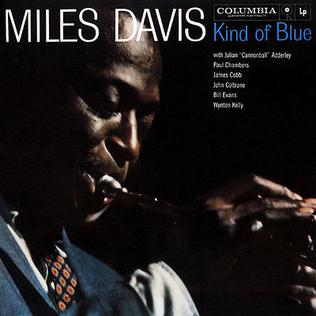
Kind of Blue is the fifth studio album released on Columbia, and twenty-eighth overall, by American jazz musician, trumpeter, composer, and bandleader Miles Davis. It was recorded on March 2 and April 22, 1959, at Columbia's 30th Street Studio in New York City, and released on August 17 of that same year by Columbia Records. For the recording, Davis led a sextet featuring saxophonists John Coltrane and Julian "Cannonball" Adderley, pianist Bill Evans, bassist Paul Chambers, and drummer Jimmy Cobb, with new band pianist Wynton Kelly appearing on one track – "Freddie Freeloader" – in place of Evans.

Keith Jarrett is an American pianist and composer. Jarrett started his career with Art Blakey and later moved on to play with Charles Lloyd and Miles Davis. Since the early 1970s, he has also been a group leader and solo performer in jazz, jazz fusion, and classical music. His improvisations draw from the traditions of jazz and other genres, including Western classical music, gospel, blues, and ethnic folk music.

Jazz fusion is a popular music genre that developed in the late 1960s when musicians combined jazz harmony and improvisation with rock music, funk, and rhythm and blues. Electric guitars, amplifiers, and keyboards that were popular in rock and roll started to be used by jazz musicians, particularly those who had grown up listening to rock and roll.

Attilio Joseph "Teo" Macero was an American jazz saxophonist, composer, and record producer. He was a producer at Columbia Records for twenty years. Macero produced Miles Davis' Bitches Brew and Dave Brubeck's Time Out, two of the best-selling and most influential jazz albums of all time. Although the extent of his role has been disputed, he also has been associated with the production of Davis' 1959 album Kind of Blue, jazz's best-selling record. Macero was known for his innovative use of editing and tape manipulation unprecedented in jazz and proving influential on subsequent fusion, experimental rock, electronica, post-punk, no wave, and acid jazz.
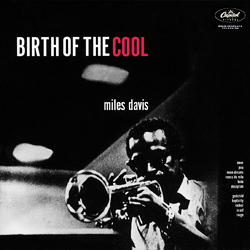
Birth of the Cool is a compilation album by American jazz trumpeter and bandleader Miles Davis, released in February 1957 by Capitol Records. It compiles eleven tracks recorded by Davis's nonet for the label over the course of three sessions during 1949 and 1950.

Big Fun is an album by American jazz trumpeter Miles Davis. It was released by Columbia Records on April 19, 1974, and compiled recordings Davis had made in sessions between 1969 and 1972. It was advertised as a new album with "four new Miles Davis compositions" One of three Davis albums released in 1974 and largely ignored, it was reissued on August 1, 2000, by Columbia and Legacy Records with additional material, which led to a critical reevaluation.

Tutu is an album by American jazz trumpeter Miles Davis, released in 1986 by Warner Bros. Records. It was recorded primarily at Capitol Studios in Los Angeles and Clinton Recording in New York, except the song "Backyard Ritual", which was recorded at Le Gonks in West Hollywood. Davis received the 1986 Best Jazz Instrumental Performance, Soloist Grammy Award for his performance on the album.
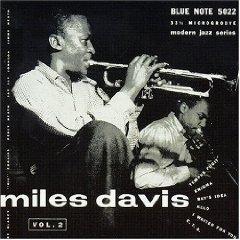
Miles Davis Volume 2 is the fifth studio album by musician Miles Davis. It refers to two separate but related entities. The first is a Miles Davis studio album released by Blue Note Records as a 10-inch LP, as BLP 5022 in 1953. The six tracks from this LP plus five alternate takes were released on CD in 1990 and remastered with restored artwork in 2001.
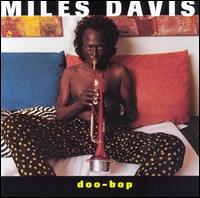
Doo-Bop is the last studio album by American jazz trumpeter Miles Davis. It was recorded with hip hop producer Easy Mo Bee and released posthumously on June 30, 1992, by Warner Bros. Records. The album was received unfavorably by most critics, although it won a Grammy Award for Best R&B Instrumental Performance the following year.
Bob Weinstock was an American record producer best known for his label Prestige Records, established in 1949, which was responsible for many significant jazz recordings during his more than two decades operating the firm.
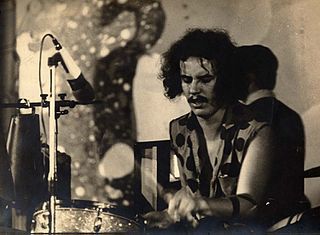
Arthur Dyer Tripp III is an American retired musician who is best known for his work as a percussionist with Frank Zappa and the Mothers of Invention and Captain Beefheart and his Magic Band during the 1960s and 1970s. Thereafter, Tripp retired from music. He attended an accredited chiropractic college in Los Angeles from 1980 through 1983, graduating with his Doctor of Chiropractic degree. He currently practices in Gulfport, Mississippi.
Johnny Dillard Lytle was an American jazz drummer and vibraphonist.

Charles Anthony "Buster" Williams is an American jazz bassist. Williams is known for his membership in pianist Herbie Hancock's early 1970s group, working with guitarist Larry Coryell from the 1980s to present, working in the Thelonious Monk repertory band Sphere and as the accompanist of choice for many singers, including Nancy Wilson.
Cafe Antarsia Ensemble (CAE) was created in New York City, United States, in 2001 when Greek/Texan Nikos Brisco and Ruth Margraff invited Egyptian-American percussionist Rami El-Aasser to join them for the live scoring of their first “world folk opera” "Judges 19: Black Lung Exhaling" created in Texas and New York and premiered at theater festivals in Moscow, Russia and Belgrade, Serbia.

Blue Period is the third studio album by jazz musician Miles Davis. It was released in 1953 as a 10" LP, his second released by Prestige Records, recorded over the course of two 1951 recording sessions at New York's Apex Studio.
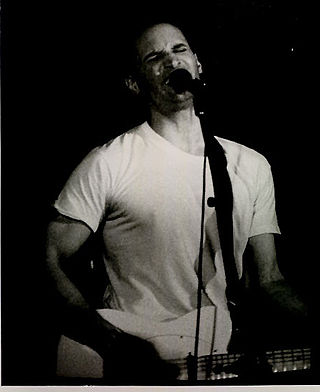
Sam Lapides is an American singer-songwriter, known as the guitarist and lead vocalist for the bands Ghosthouse and Folkminers. He cites Paul Westerberg, The Replacements, The Rolling Stones, and Bob Dylan as influences. His folk-rock sound has been classified as Americana (music). Throughout his career, he has produced a variety of recordings and completed numerous tours of the United States and Europe.

Live Around the World is a live album by American jazz musician Miles Davis. The single CD contains live recordings from 1988 to 1991. The album peaked #4 in the Billboard Top Jazz Album chart.
While the French horn is primarily used in classical music pieces, in the mid-20th century it broke into the jazz world. While the instrument remains relatively rare, the role of the French horn in jazz has developed from its beginnings in the 1940s through to the 2010s. Note that the expression "horns" in jazz is often used colloquially to refer to all wind instruments used in jazz
















